June
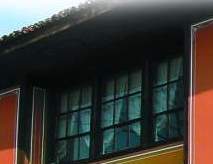 In
the Roman calendar Junius is a month
In
the Roman calendar Junius is a month
dedicated to the goddess Junona, wife of
Jupiter. The Bulgarians call this month “red”
and believe that like June like December.
31 May - 6 June ROUSALSKA NEDELYA (Midsummer Week)
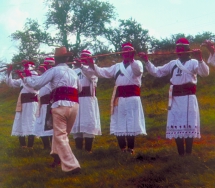 The
week after Whitsunday is called
The
week after Whitsunday is called
Rousalska Nedelya (Mermaid Week). It is
believed that until the day of the Holy Ghost
the mermaids have already done their job on
earth – they have sown the seeds of fertility.
Houses are decorated with wormwood and
young girls put sprigs of it in their bosom,
young men in their left pocket, and the children
on their neck, in a small cotton bag like
an amulet. In this way people protect themselves
against the mischief of the mermaids. A man never starts alone on a journey
on
that day for he may lose his mind – get the mermaid disease. And
only the mermaids
can heal him. The “rousaliy” are men who go in groups of uneven
numbers (3, 5, 7, 9, 11, 13)
the whole week and give people and nature health and fertility. They are
dear guests in
every house. In Western Bulgaria the rousaliy are also called “kalushari”.
The leader of the kalushari is called "Vataf" and the position
is hereditary – following the
male line. It is only the Vataf who is allowed 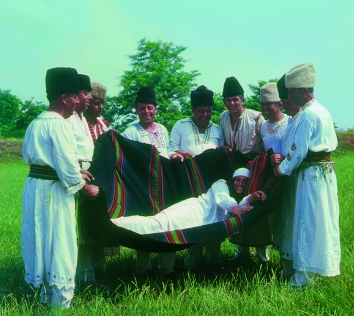
to pick medicinal herbs and only he knows
the incantation, which is pronounced over
the herbs and the flag. By verbal magic he
transmits the magical force of nature to the
chosen kalushari.
The kalushari are young married men,
who are healthy and quick, they don’t drink,
they are honest and goodhearted, can keep
secrets and suffer privation for they may not
go back to their homes during the whole
Mermaid Week. After each one of them
endures the fasting period determined by
the Vataf, he is consecrated by the leader and
he has to learn the rituals. It is only then that
the consecrated kalushar makes an oath
before the flag, the mermaid stick and the
other kalushars.
The oath is very strange and the words
are a terrible curse: “Let no fire burn in my house, let no smoke
pass through the chimney, let snakes and lizards make their nests in it,
let owls lay their eggs in it. Let my wife see no cradle, let no ewe bleat,
let us not hear the ox and the cow, the stallion and the mare, let no
dog bark, let no rooster crow. Let weeds grow all over my house. Let me
not see with my eyes and hear with my ears, let me not pronounce a word
with my tongue, let me not walk with my feet and hold with my hands. Let
everything get dry wherever I set foot, let everything I touch burn in
fire. In front of me – the plague, behind me – cholera. Let
my bones find no grave if I break the oath of the Kalusha.” After
that he kisses the flag and the stick, the Vataf sprinkles wonder-working
water on him. On kissing the hand of the leader the man is accepted as
a kalushar and he can carry the mermaid stick. The stick is very special.
The old kalushars say that the mermaid stick is like the scepter of the
priest. The stick is made of sycamore, ash-tree or corneltree.
It is about a meter and a half long and 2 cm thick. At its lower end there
is a sharp metal point, it is decorated with various colors and bells,
box-tree branches and multicolored threads. In the upper end the Vataf
makes a hole in which he puts herbs and closes it with a wedge. The sticks
are kept by the leader and he gives them to the kalushars only during
the Mermaid Week. The stick is preserved and inherited as a precious treasure.
The Vataf carries a flag and no one else can have it. It is made by the
leader himself
from white linen in the presence of all kalushars. It is about two and
a have cubits long and spreads to the middle of the stick. In the four
ends are sown miraculous herbs, it is sprinkled with “silent”
water and played with mermaid music. On the top the Vataf makes a nosegay
from the herbs – meliot, gentian, hellebore, iris, wormwood, dittany
and three bulbs of garlic. When it is ready they all bow to it, the leader
kisses the flag and the kalushars kiss the stick. The kalushars are dressed
as the people in the village where they live. Only their feet are clad
in white woolen socks, decorated with herbs. They have iron bells sown
to their dress and when they perform the rituals and dance they make a
big noise. On their fur caps they put wreaths of herbs. The kalushars
cannot dance without someone playing the music. The preferred
musical instrument is the shepherd’s pipe or a wooden pipe. Later
it was replaced by a bagpipe or zourna and a drum. The kalushar dances
are of two kinds – some are for prosperity and others are for health,
and they very much resemble the quick dance in the night after a wedding.
Their cries are very similar too.
The rousaliy can heal only those suffering from a mermaid illness –
the ones who are growing weak bewitched by mermaids. How is the healing
done: When the band goes to the house of the sick person the Vataf examines
him and decides whether the sickness can be healed or not. Then he negotiates
with his family the price. He prepares the pot and the bowl. The pot must
be new and made of clay, full of “silent” water and herbs
selected by the Vataf, covered with a piece of cloth donated by the sick
person. The bowl is also new, made of clay with green varnish. In it there
is vinegar with water and crushed
garlic. It is placed on a small round table, covered with a white tablecloth.
The sick man is brought in by his relatives in a woven rug, which is spread
on the ground before the kalushars. They stand in a circle, arranged by
seniority. The oldest and the youngest one close the circle round the
sick man.
At first their dance is slow but gradually it quickens. The tempo is dictated
by the Vataf by raising and lowering the flag. When the flag is down the
kalushars dance at one place, pressing the stick against their back and
thrusting their breast. After dancing for some time, they pick the ends
of the rug with the sick man and throw him in the air, crying “Hey,
Kalusha!” Then they step back.
The Vataf enters the circle of the kalushars, goes to the sick man and
rubs him with the mixture from the bowl on the forehead, the hands, the
legs and chants: “Hey, Kalusha! There came out 77 and a half bad
night evils – muddy, dirty and terrible. They came out of the forest,
of the river banks, of the rocks, of
valleys, of mountains. They crossed the field and swept it away, they
passed through the forest and destroyed the forest, they passed through
water and dried the water. Those who saw them and heard them all ran away.
And this one (the name of the sick man is pronounced) came out at midnight
and was stuck and cannot run away. They caught him on the spot, climbed
on his head, broke his bones, tore his intestines, ate his flesh, drank
his blood. He cannot go anywhere, he cannot hide anywhere, from pain and
evil. So he went to the crossroads, cried out to the skies, poured his
tears to the earth, but nobody saw him, nobody heard him. He was heard
by the Holy Mother and she asked him in a low voice: “Why are you
crying? Why are you complaining?” Said (the name of the sick man):
“I am crying, I am complaining
because 77 and a half bad night evils went out – muddy, dirty and
terrible. They came through the fields and swept them away, they came
through the forest and destroyed it, they came through water and dried
it. Whoever saw them and heard them ran away. But they caught me and made
me sick.” To him said the Holy Mother: “Dont you cry, don’t
you complain. Find the young men, sworn brothers, find the rousaltzi and
the kalushartzi to dance for you, to treat you with mermaid herbs and
infusions, to protect you with their mermaid sticks. They will drive away
all evil things to the forest where sheep don’t bleat, where goats
don’t baa, where ewes don’t bleat and the girls don’t
dance the horo. There is a good man with them, riding a black horse, on
a blue saddle, with a cap and a green wreath. There the Holy Mother prepared
a wedding and sent the good man to drive the pain out to the forest where
there is a barren cow, where
they eat offal, to spread a hide for them to sleep on, to sleep a sweet
sleep and eat a good meal!" That’s enough from me, God can
offer more! Hey, Kalusha!“ The incantation is mumbled in a low voice
and one can hear only incidental phrases. Then the leader puts down the
flag over the sick man, blows in the four directions, gives him to drink
three times from the bowl and steps back. The kalushari start dancing
again and this time they jump over the sick man with the exclamation “Hey,
Kalusha!” After the third time the one who is playing the music
plays “the rousali way” and the tempo quickens. Then on a
sign from the
Vataf the oldest kalushar in the band, who dances first, strikes with
his stick the pot with the water and the herbs and it sprinkles everybody.
At this moment the sick man gets up and runs away – he is completely
healthy, and a few kalushars (three at the most, depending how bad the
sickness is) fall on the ground like dead. They receive the sickness symbolically.
Only this way a man can be healed. The kalushars on the ground are treated
in the same way – with a dance but in the opposite direction. The
Vataf makes them drink from the bowl as well. Two men from the band pick
them up in their arms while they recover and join the dance. The kalushars
visit the houses from Monday till Sunday noon. Then dancing they
hand their sticks to the Vataf who takes them home. The kalushars kiss
the leader’s hand, each one of them takes off the herbal wreath
from his cap, takes off the socks and the “rousalya” ends
up with a meal for all.
7 June. Nameday of Valery, Valeria (from the old Latin family name Valerius ‘I am strong’).
11 June VARTOLOMEEVDEN (St. Bartholomew’s Day)
turns towards winter. That is why they get up very early, before dawn,
so when the sun
shows above the Sea of Azov it shines on them first and they will be healthy
and strong
until the next St. Bartholomew’s Day. People celebrate St. Bartholomew
as the
second of the hail men – the brothers German, Bartholomew, Lise
and Vido.
People respect this day so no hail falls during the summer and there are
no snow
storms in winter. Old Bulgarians from Berdyansk, Tavria, say that on this
day the sun

14 June LISEEVDEN (Lise’s Day)
According to popular belief Lise is the third brother hail
man. He is lord of the black hail clouds in summer and snow storms in
winter. Old people celebrate this day for the disease “liso”
which makes people bald (lisi) – their hair and their beard and
moustaches fall out. For that reason the young fellows on this
they make “bald breads”, light candles, collect herbs, pour
herbal teas on themselves and bathe in left water (at a left turn of the
river) or the tea is poured through the left sleeve of a coat. They believe
that their hair will become curly and will never fall out.
15 June VIDOVDEN (Vido’s Day)
On this day Bulgarians celebrate the last brother hail man – Vido. But only those who have celebrated the other three brothers can participate. People believe that Vido punishes the sinners. This explains the old saying "Vido’s Day will come!"
24 June ENYOVDEN (Enyo’s Day) (Midsummer
Day)
(Yaniuvden)
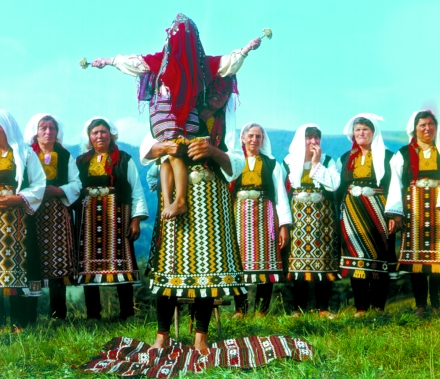 This
ancient Bulgarian ritual is a basic, turning point in the mythological
calendar of
This
ancient Bulgarian ritual is a basic, turning point in the mythological
calendar of
the ancient peoples, connected with the summer equinox when the day is
longest and the night is shortest. Enyo’s Day is a
favorite summer holiday for young and old. It divides the year into two.
It is believed that
after it winter sets on its long way to the people. The story of how Enyo
put on his furcoat and went to search for snow reminds
that it is time to think about the long cold months.
People get up early on that day to see how the sun “turns three
times” and whoever manages to "bathe" in the dew will
be safe
from illnesses until next Midsummer Day. Old people say that a long, long
time ago, in a village two young people – Enyo and Stana were very
much in love. Every day they thought of each other and the bread
was not tasty if they didn’t see one another at least from afar.
But the girl’s father had decided something else and arranged an
engagement for Stana in another village.
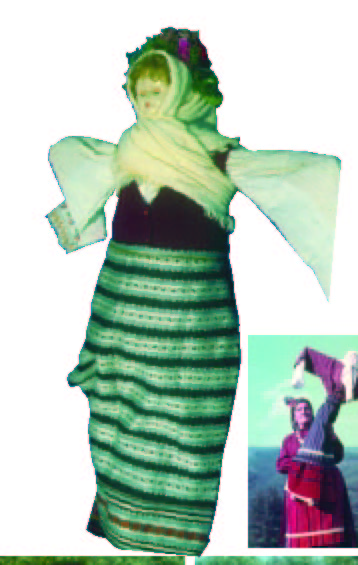 The
wedding was ready and the matchmakers
The
wedding was ready and the matchmakers
came to take Stana. The girl went
with them for you never turn back a wedding.
When they reached the big bridge over
the river Tundja she pulled down the bridal
veil and threw herself into the river.
Her beloved Enyo fell ill with sorrow. He
lay ill in bed for nine years and nine beds got
rotten under him. During that time there was
not a drop of rain in the village. The river
dried up and death struck people and animals.
On the tenth year Enyo’s sister took the
forebeam from the loom, put the rolling-pin
crosswise and wrapped it with a baby bundle.
Then she dressed it in women’s clothes,
covered it with a white veil and went to
Enyo. “Get up, Enyo, get up, brother,” she
said, “to see your Stana has come to be your
bride…”
The poor man opened his eyes wide, a
smile shone on his face, he raised himself
with open arms and then died.
Strong winds blew and heavy rains
poured. The fields grew green, the sheep
bleated, and the young girls sang songs of
love. Since then there is a custom on Enyo’s
Day the young girls to make a “bride” and
sing songs of wedding and prosperity. Then
they “sing over” the rings to see what man
will love them and the music and dances
have no end on that day.
Nameday for Yanko, Yanka.



29 June PETROVDEN (St. Peter’s Day)
This holiday is in midsummer. The people
are working hard in the fields, “wheat is
baked”. A legend of the Bulgarians in Tavria tells that Saint Peter
himself, on seeing how
people harvest, took the sickle to help them. The St. Peter fast ends
with meat on the
table – black chicken, slain on the threshold of the house for health
and strength, for Peter
means ‘stone’. On the table there are also juicy apples, sanctified
at the morning service
in church. In the evening Petar, Petrana and Kamen celebrate their nameday.
30 June PAVLYOVDEN (St. Paul’s Day)
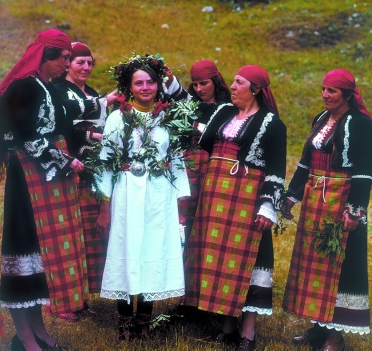 BUTTERFLY
BUTTERFLY
There is no strict prohibition for work on
St. Peter’s Day but on St. Paul’s Day people don’t work
in order to protect themselves from fires. Nobody makes a fire on that
day, nobody bakes bread so that wheat does not burn in the field. The
folk saying is: “On Peter’s Day you must harvest so that he
does not blow the crops away. On Paul’s Day lie face down so that
he does not burn the crops!” – “Little Paul makes big
trouble!” (Paulus means ‘little’).
This is the nameday of Pavel, Pavlina. “Butterfly” is a ritual
which has no fixed date. It is usually performed during the
“Peter’s month”, when the weather gets dry. Only young
girls participate (about a dozen), dressed in shirts with green branches
hanging from their belts (branches of elder, ivy or willow). For the “butterfly”
is chosen a little girl (8–12 years of age), an orphan or the last
born, i.e. the last child in a numerous family, and it is covered all
over with greenery. The butterfly goes round the houses from
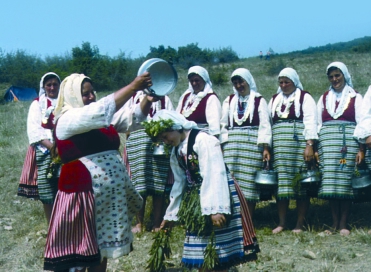 “small
noon” until evening but never after
“small
noon” until evening but never after
dark. When they go into the yard the girls
start singing:
A butterfly flies, through the field it flies
and prays to God:
Give us, dear God, rain and rich crops,
To have wheat and rye, For my mother to make small sweet buns, Give us,
dear God, rich crops! The butterfly jumps, waves her hands and goes round
in a circle. The woman of the house takes out a bucket of water with a
few drops of wine in it and pours it over the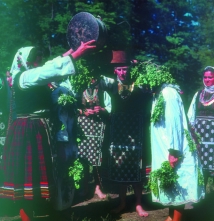
dancing butterfly. The latter sprinkles everybody for health, rain and
fertility. To thank the “priestess”, bearer of good, the woman
of the house gives the girls a sieve full of white flour, butter, cheese,
eggs and sweets. To the
butterfly she gives small coins, a jewelry or a dress.
On going out of the house the woman rolls the empty sieve and they guess
on it whether the year will be good or bad.